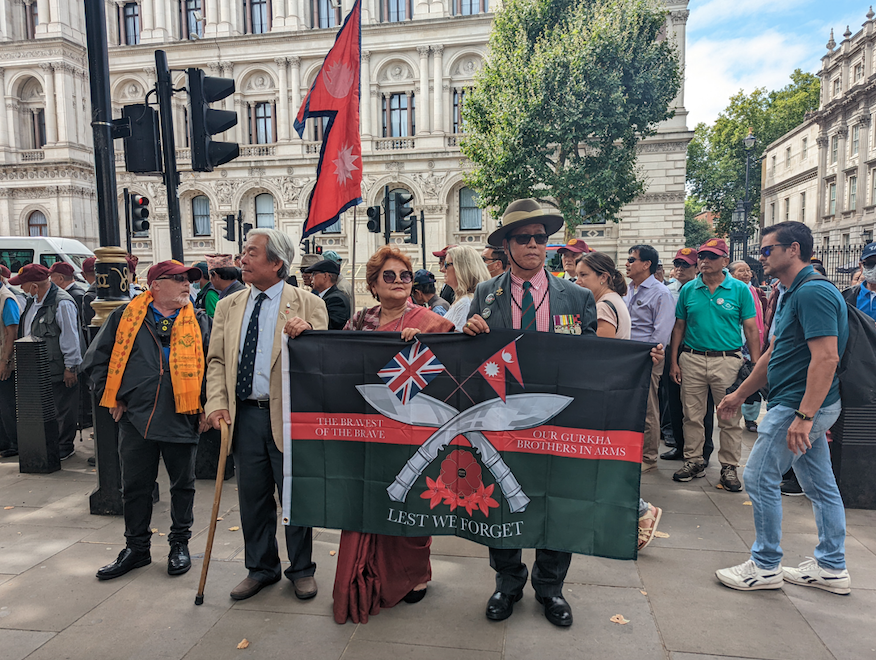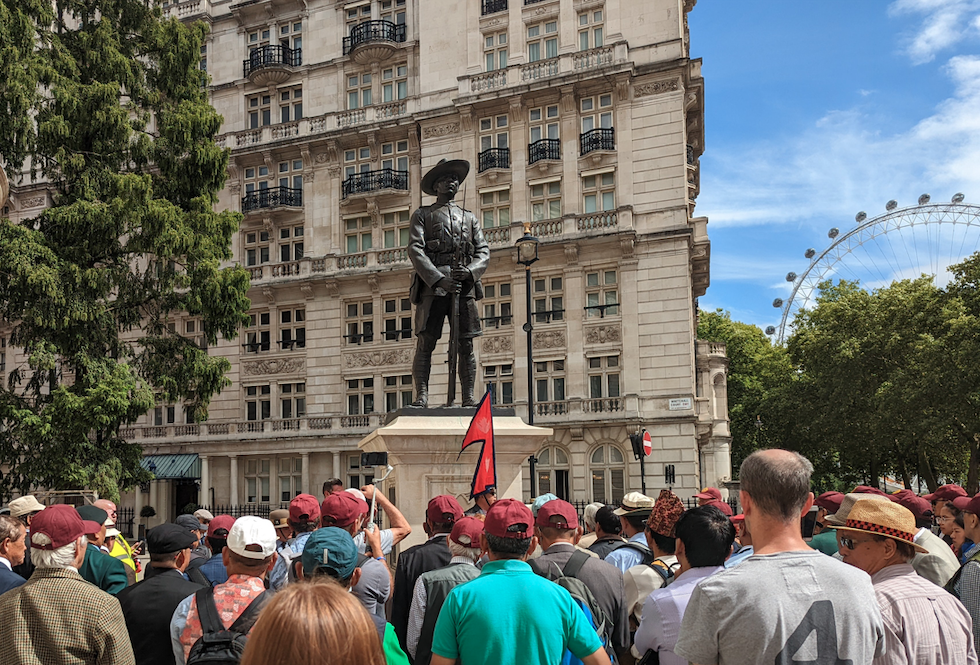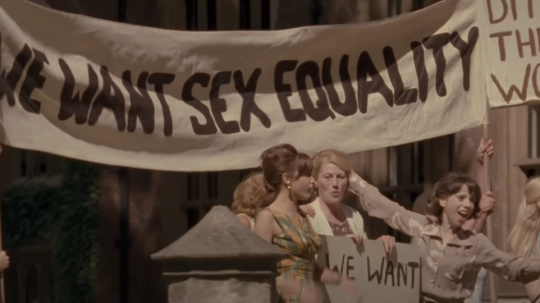On 19 August 2022, Gurkha veterans gathered outside Downing Street to commemorate last year’s hunger strike over pension rights for pre-1997 retirees. Gurkha veterans continue to fight ‘discriminatory’ pensions that have left them with unequal allowance compared to British counterparts. After years of being left in the dark, a group are taking action.
The Gurkha Justice Campaign has been protesting for on issues of citizenship, compensation and pensions. Leading campaigners of the Gurkha justice campaign, Gyanraj Raj, Dhan Gurung and Pushpa Rana Ghale ended a 13-day relay hunger strike last year after the government agreed to enter into talks regarding Terms of Reference (ToR). However, it was 12 months before a meeting took place. On 22 August, chief negotiator Major (retired) Jud Bahadur Gurung entered into discussions in Whitehall with the Embassy of Nepal and the Ministry of Defence.
A colonial-era legacy
First recruited in 1815, Gurkhas have been denied equal pay and pensions to their British counterparts since 1948 when the Brigade of Gurkhas officially became a part of the British Army under the 1947 Tripartite Agreement (TPA). The agreement declared that the treatment of Gurkhas must be “on the same footing” as their British counterparts, yet the government violated it and based Gurkhas’ pay and pension on the British Indian Army pay rate.
Gurkhas have been reportedly been subjected to historical discrimination by the British government due to their race and national origin, which could be in breach of the Human Rights Act under Article 14. The Centre for Nepal Studies UK (CNSUK) revealed a 1989 House of Commons report where the disparity in pensions reached up to 948% that year between a Gurkha and British Captain.
Jud Bahadur Gurung, the spokesperson for the campaign, served for 33 years in the British Army after joining as a boy. Before 2000, his pension was approximately £50 per month, a mere 4% of what his British counterpart received. He spoke of his grievances, especially as his ill wife required medical attention.
He said: “Even the pay wasn’t there. What people don’t understand is it’s not just the pensions. We cannot go back on those. The pay was about 16 times less to a British, while we were doing the same thing. The way they treated us is horrendous, to say the least.” Due to the success of the campaign, his current pension is now £600 per month, but his British counterpart of the same rank still receives over £2,000 per month.

Credit: Ella Hopkins/EachOther
Arbitrary new pension rules
In 2007, pension rules changed, which gave serving Gurkhas equal pensions to other service personnel in the UK. However, the new pension rules only applied retrospectively from 1 July 1997, which the government acknowledges as the year the UK became the base for the Gurkha Brigade.
This means that the pension rules were not applicable to retirees prior to 1997. A year’s service after 1 July 1997, counted as a year’s service in the Armed Forces Pension Scheme (AFPS). However, a year’s service before that date only counted as a proportion of a year: between 23%-36% depending on rank. Those who left before 1 July 1997 were not eligible to transfer their pensions.
Shree Limbu, 54, a retired British Gurkha sergeant, joined the British Army in 1985, earning as little as HK$900 (£98) a month in Hong Kong as a rifleman, while his British counterpart of the same rank earned HK$10,000 (£1,090) a month. He said, “Only one-third of my service before 1997 would count. I did 18 years of service, but only 12 years would be fully credited. There was discrimination in every step. The pay terms and conditions for Gurkhas were fraudulent.”
However, the pension disparity is justified by the government because prior 1st July 1997, Gurkhas were considered as an “overseas force”. As such, the Gurkha Pension Scheme (GPS) was thought to provide a fair standard of living in Nepal. Yet this is a poorly justified argument since Gurkhas have been an integral part of the British Army under the same job and after new immigration rules, many Gurkha families came to settle in the UK seeking better living conditions, but the paltry pension did not cover UK’s rising living costs. Gurkhas’ pay and pension disparities are clear, decades-old inequalities linked to unfair terms and conditions from a colonial-era legacy.
A decades-old fight
The Gurkha Justice Campaign has enjoyed some major successes. In September 2004, Gurkhas who retired after 1997 were allowed to settle in the UK with their families. Pre-1997 Gurkha retirees later followed after a high-profile campaign in 2009 led by actor Joanna Lumley, whose father served in the 6th Gurkha Rifles. However, arbitrary measures were constantly implemented to make the transition harder for Gurkhas and their families such as the initial exclusive policy for pre-1997 retirees regarding right of abode.
Many feel that the government and Ministry of Defence (MoD) have discriminated against Gurkhas over the decades and treated them under an unequal footing to their British counterparts. If found to be the case, it would potentially violate the Tripartite Agreement of 1947. Under Article 55 of the UN charter, the government may be breaching diplomatic directives for international cooperation between Nepal and Britain, threatening their centuries-old relationship.
Former Gurkhas and Gurkha veterans reiterate that the heart of the issue is about justice and dignity. They want to be treated equitably compared to their British counterparts, with retrospective amendments, so a diplomatic solution can finally be reached.
You can learn more about the campaign here.
The views expressed in this article are those of the author and do not necessarily reflect the views of EachOther.





